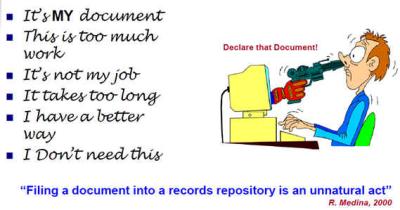RIM, ECM, Content Services etc.
Unnötige semantische Geplänkel um Deutungshoheiten.
http://www.project-consult.de/comment/6076#comment-6076
Diskussion mag nötig sein, aber im Endeffekt schert sich der Enduser keinen Deut um die Begriffe. Er will möglichst effizient Zugriff auf seine tägliche Information um damit Insights und Mehrwert zu schaffen.
Informationsmanagement ist am einfachsten zu vermitteln. vgl. Leitfaden Information Governance s.63/64
http://informationgovernance.ch/angebote/leitfaden-information-governance/
In den letzten Jahren hat sich in der Fachgemeinde allmählich die
Einsicht durchgesetzt, dass es nicht mehr wichtig ist, ob geschäftsrelevante
Information in irgendeinem System oder in der File-Ablage als
«record» qualifiziert und deklariert wird. Einige Experten (nicht nur
der grösste Fachverband ARMA) empfehlen, den auch in den USA
etwas verstaubten Begriff «records management» durch die offenere
Bezeichnung «Information Lifecycle Management» (ILM) oder «Information
Lifecycle Governance» (ILG oder ILMG) zu ersetzen.
Wir schlagen vor, eine solche semantische Formel zu adaptieren,
sich grundsätzlich auf die Anforderungen, wie sie in der ISO-Norm
15489 (30300) formuliert sind, zu beziehen; hingegen die verschwimmenden
Termini «Dokument», «Record», «Content», «ECM»
u. ä. nur noch im Fachdiskurs zu verwenden und sich stattdessen
allgemein auf den übergreifenden und breit akzeptierten Begriff «Informationsmanagement
» zu einigen.
en:
----------
In recent years, the professional community gradually realized that it is no longer important to qualify and declare business-related information on any system or in filing cabinets as a “record”. Some experts (including the largest trade association ARMA) recommend (in the United States) replacing the older term “records management” with the open label “Information Lifecycle Management (ILM)” or “Information Lifecycle Governance (ILG or ILMG)”.
Here it is proposed that such a semantic formula be adapted to refer to the requirements as formulated in ISO standard 15489 (ISO 30300); however, the blurred terms “document”, “record”, “content”, “ECM”, and the like are only used in professional discussions and as such, generally agree on the overarching and widely accepted term “information management” as described in this chapter.
http://www.project-consult.de/comment/6076#comment-6076
Diskussion mag nötig sein, aber im Endeffekt schert sich der Enduser keinen Deut um die Begriffe. Er will möglichst effizient Zugriff auf seine tägliche Information um damit Insights und Mehrwert zu schaffen.
Informationsmanagement ist am einfachsten zu vermitteln. vgl. Leitfaden Information Governance s.63/64
http://informationgovernance.ch/angebote/leitfaden-information-governance/
In den letzten Jahren hat sich in der Fachgemeinde allmählich die
Einsicht durchgesetzt, dass es nicht mehr wichtig ist, ob geschäftsrelevante
Information in irgendeinem System oder in der File-Ablage als
«record» qualifiziert und deklariert wird. Einige Experten (nicht nur
der grösste Fachverband ARMA) empfehlen, den auch in den USA
etwas verstaubten Begriff «records management» durch die offenere
Bezeichnung «Information Lifecycle Management» (ILM) oder «Information
Lifecycle Governance» (ILG oder ILMG) zu ersetzen.
Wir schlagen vor, eine solche semantische Formel zu adaptieren,
sich grundsätzlich auf die Anforderungen, wie sie in der ISO-Norm
15489 (30300) formuliert sind, zu beziehen; hingegen die verschwimmenden
Termini «Dokument», «Record», «Content», «ECM»
u. ä. nur noch im Fachdiskurs zu verwenden und sich stattdessen
allgemein auf den übergreifenden und breit akzeptierten Begriff «Informationsmanagement
» zu einigen.
en:
----------
In recent years, the professional community gradually realized that it is no longer important to qualify and declare business-related information on any system or in filing cabinets as a “record”. Some experts (including the largest trade association ARMA) recommend (in the United States) replacing the older term “records management” with the open label “Information Lifecycle Management (ILM)” or “Information Lifecycle Governance (ILG or ILMG)”.
Here it is proposed that such a semantic formula be adapted to refer to the requirements as formulated in ISO standard 15489 (ISO 30300); however, the blurred terms “document”, “record”, “content”, “ECM”, and the like are only used in professional discussions and as such, generally agree on the overarching and widely accepted term “information management” as described in this chapter.
jhagmann - 18. Jul, 15:31
